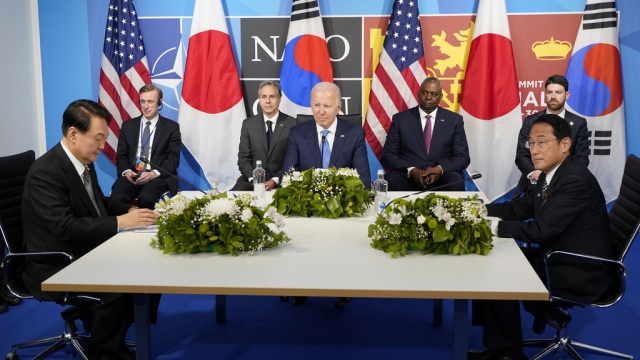President Biden marked a "new era" in the trilateral relationship with Japan and South Korea at Camp David Friday. A historical summit with Japanese Prime Minister Fumio Kishida and South Korean President Yoon Suk Yeol deepened security and economic cooperation between the countries.
The meeting marked a significant effort to solidify trilateral relations, in the midst of increasing provocation from North Korea, more aggression from China and tensions in the Taiwan Strait. The leaders unveiled wide ranging cooperation on defense, economy, technology, communications and people-to-people relations.
"This summit was really about our relationship with each other, and deepening cooperation across an entire range of issues," President Biden said. "It was about a more peaceful and prosperous Indo-Pacific, a region quite frankly that would benefit everyone living there and around the world if we get it right."
The leaders agreed to consult in times of provocation and crisis, though senior administration officials noted it is not a collective defense agreement. Officials also said they would take steps to invest in a crisis communications line. Other agreements included a framework that includes annual defense exercises, taking steps to activate real time missile warning data sharing in regards to North Korea and a working group on DPRK cyber activities. On economic security, the leaders committed to a supply-chain disruption early-warning system, important for things like critical minerals and batteries.
SEE MORE: Biden's approval rating on the economy stagnates as inflation slows
President Biden said the meeting launched "a series of initiatives that are actually institutional changes in how we deal with one another. And security cooperation, economic cooperation, technology cooperation, development cooperation, consultation exercises. And all of this will create our momentum, I believe, year by year, month by month, to make the relationship stronger and more certain to remain."
All three leaders underscored the evolving security environment, though Biden reiterated the U.S. did not view the summit as focused on China, though it was part of the conversation and a source of shared concerns.
In a statement issued at the summit, the leaders said they "strongly oppose any unilateral attempts to change the status quo in the waters of the Indo-Pacific."
Biden indicated he planned to follow up on the conversation he had with Chinese President Xi Jin Ping last year in Bali in the fall.
China had been critical of the summit ahead of its commencement.
Notably, the leaders worked to solidify their relationships with a focus on durability. The leaders also agreed to meet annually.
"The new programs and forms of cooperation that we will achieve, are designed to bind our countries together, whether that's on issues related to national security or economics or development, we're going to make sure that our governments and our societies are working more closely together than ever," said Mira Rapp-Hooper, senior director for East Asia and Oceania at the National Security Council.
SEE MORE: Celebrating Korean Independence Day in America
The U.S. has held close ties with Japan and South Korea. Over the last year, South Korea and Japan made progress overcoming historical challenges in their own relationship. President Biden noted their 'political courage.'
"This is a worthy legacy for the president, for President Yoon, for Prime Minister Kishida, and for all of the teams that have done so much work to get us to this point and to see this point not just as the culmination, but the launch of this new era and trilateral cooperation that we believe will come to the strong benefit of each of our three countries," said White House national security adviser Jake Sullivan.
This was the first official summit for the three countries, though they have met before on the margins of other events. Camp David was an intentional choice, reflecting the priority Biden places on the alliances. The summit reflects Biden's larger foreign policy effort to bolster U.S. alliances and portray his leadership on the world stage.
SEE MORE: North Korea confirms it detained US soldier who ran across border
Trending stories at Scrippsnews.com





